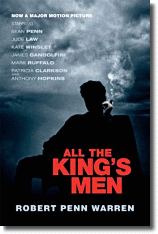The essay notes that Robert Penn Warren's All the King's Men, a work of fiction closely patterned on the career of the late governor, shaped the public perception of Long.
Since 1948, Huey's reputation has been acquiring a patina not unlike that noticed also on a bronze likeness in Statuary Hall of the U. S. Capitol. Warren himself found occasion to salute Huey when he recalled the genesis of his novel in an essay entitled "All the King's Men: The Matrix of Experience" that appeared in the Winter 1964, issue of the Yale Review. Warren begins his paper:

When I am asked how much All the King's Men owes to the actual politics of Louisiana in the '30's, I can only be sure that if I had never gone to live in Louisiana and Huey had not existed, the novel would never have been written. ... In the summer of 1934 I was offered a job—a much-needed job—as Assistant Professor at the Louisiana State University in Baton Rouge. It was "Huey Long's university". ...
Warren relates how governmental neglect in Louisiana had incubated Huey and how Huey had inspired Willie Stark's creation. He also recalls LSU classrooms:Among the students there sometimes appeared, too, that awkward boy from the depth of the "Cajun" country or from some scrabble-farm in North Louisiana, with burning ambition and frightening energy and a thirst for learning; and his presence there, you reminded yourself, with whatever complication of irony seemed necessary at the moment, was due to Huey, and to Huey alone. For the "better element" had done next to nothing in fifty years to get the boy out of the grim despair of his ignorance.
....
Arthur Krock, who had headed the Washington bureau of the New York Times when Huey was the most despised among senators but the most colorful and gallery-pleasing Senate orator, wrote of Huey in his Memoirs: Sixty Years on the Firing Line (1968). Krock suggests a seminal national influence:
I believe that in the short but stormy era of his political ascendency, before an assassin's bullet ended it in September, 1935, Long established himself as the first important architect on a nationwide scale of what Lyndon B. Johnson programmed thirty years later as "the Great Society."
With the recent release of the second film adaptation of Warren's book, we may see a rekindled interest in the life and career of Huey P. Long. Until then, McSween's essay is a good place to get up to speed on the legend.
--Marshal Zeringue






